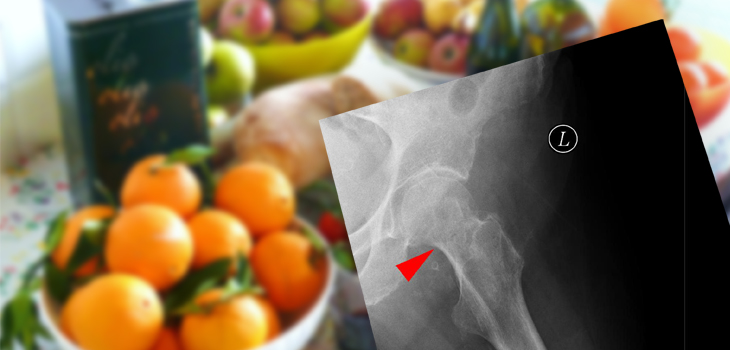দ্য Mediterranean Diet emphasizes fruits and vegetables, whole grains, nuts and legumes, lean meats, fish, and healthy fats. It has been reported to have many health benefits, including cardiovascular health and cognitive function. Despite the fact that the diet does not emphasize dairy products, which are good sources of calcium and vitamin D, a new study has found that it reduces the risk of hip fractures. The findings were published online on March 28 in the journal JAMA Internal Medicine by an international team of researchers.
The objective of the study was to examine the association between adherence to a diet quality index constructed on the basis of dietary recommendations or existing healthy dietary patterns and fractures in postmenopausal women. For the study, the investigators reviewed data from 40 medical clinics throughout the United States that were included in the Women’s Health Initiative (WHI) observational study. The study group comprised 93,676 women who were eligible for the WHI if they were aged 50 to 79 years. The women were recruited from October 1, 1993 through December 31, 1998; the study ending August 29, 2014.
The WHI food frequency questionnaire was used to determine the participants’ nutrient and food intake at study onset. Diet quality and adherence were assessed by scores on the alternate Mediterranean Diet (aMED), which is a 9-category measure of adherence to a Mediterranean dietary pattern; the Healthy Eating Index 2010 (HEI-2010), a 100-point measure of 12 food components; the 11-item Alternate Healthy Eating Index 2010 (AHEI-2010); or the 8-component Dietary Approaches to Stop Hypertension (DASH) diet score.
The investigators looked at total and hip fractures and calculated risk of fracture via statistical analysis. Of the 93,676 women, 90,014 were included in the analysis (average age: 63.6 years). During an average follow-up of 15.9 years, 2,121 cases of hip fractures and 28,718 cases of total fractures occurred. Women scoring in the highest quintile (20%) of the aMED index had a lower risk for hip fractures (29% reduced risk). No association between the aMED score and total fractures was found. Higher HEI-2010 or DASH scores tended to be inversely related to hip fracture risk; however, the difference was not significant. The AHEI-2010 score was associated with neither hip nor total fractures.
The authors concluded that higher adherence to a Mediterranean diet is associated with a lower risk for hip fractures. They noted that their results reveal that a healthy dietary pattern may play a role in maintaining bone health in postmenopausal women.
The researchers are affiliated with: University of Würzburg, Würzburg, Bavaria, Germany; David Geffen School of Medicine, UCLA; Fred Hutchinson Cancer Center, Seattle, Washington; Kaiser Permanente Center for Health Research Northwest, Portland, Oregon; School of Medicine, University of Alabama at Birmingham; Medical College of Georgia at Georgia Regents University, Augusta; The Ohio State University, Columbus; College of Medicine, University of Tennessee Health Science Center, Memphis; State University of New York at Buffalo; University of Massachusetts Medical School, Worcester; Graduate School of Public Health, University of Pittsburgh, Pittsburgh, Pennsylvania; and Department of Epidemiology and Population Health, Albert Einstein College of Medicine, Bronx, New York.



